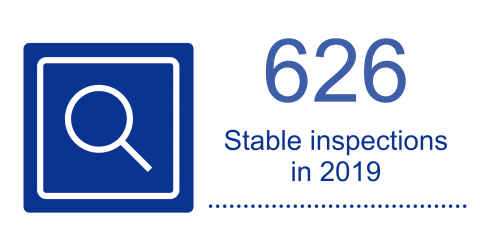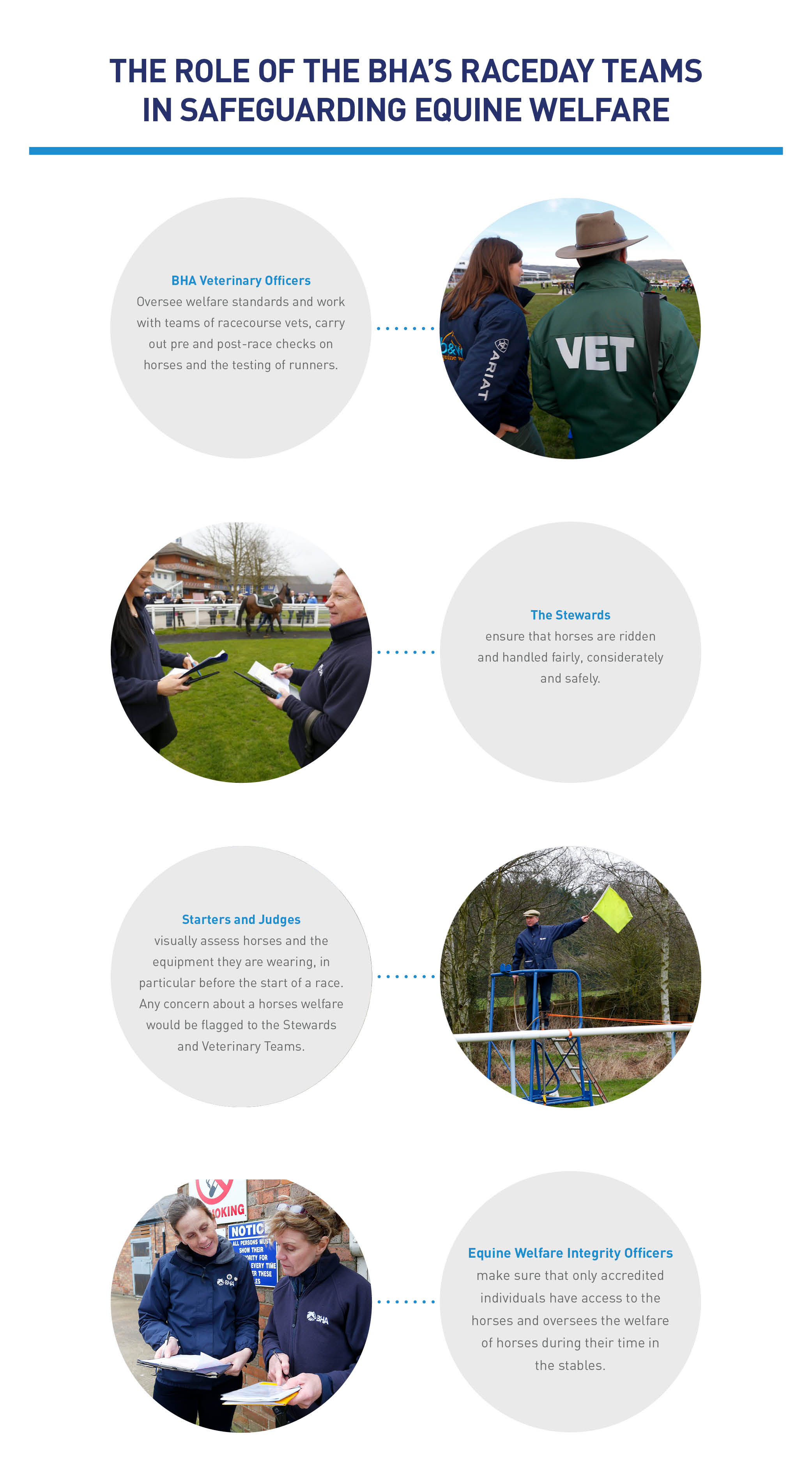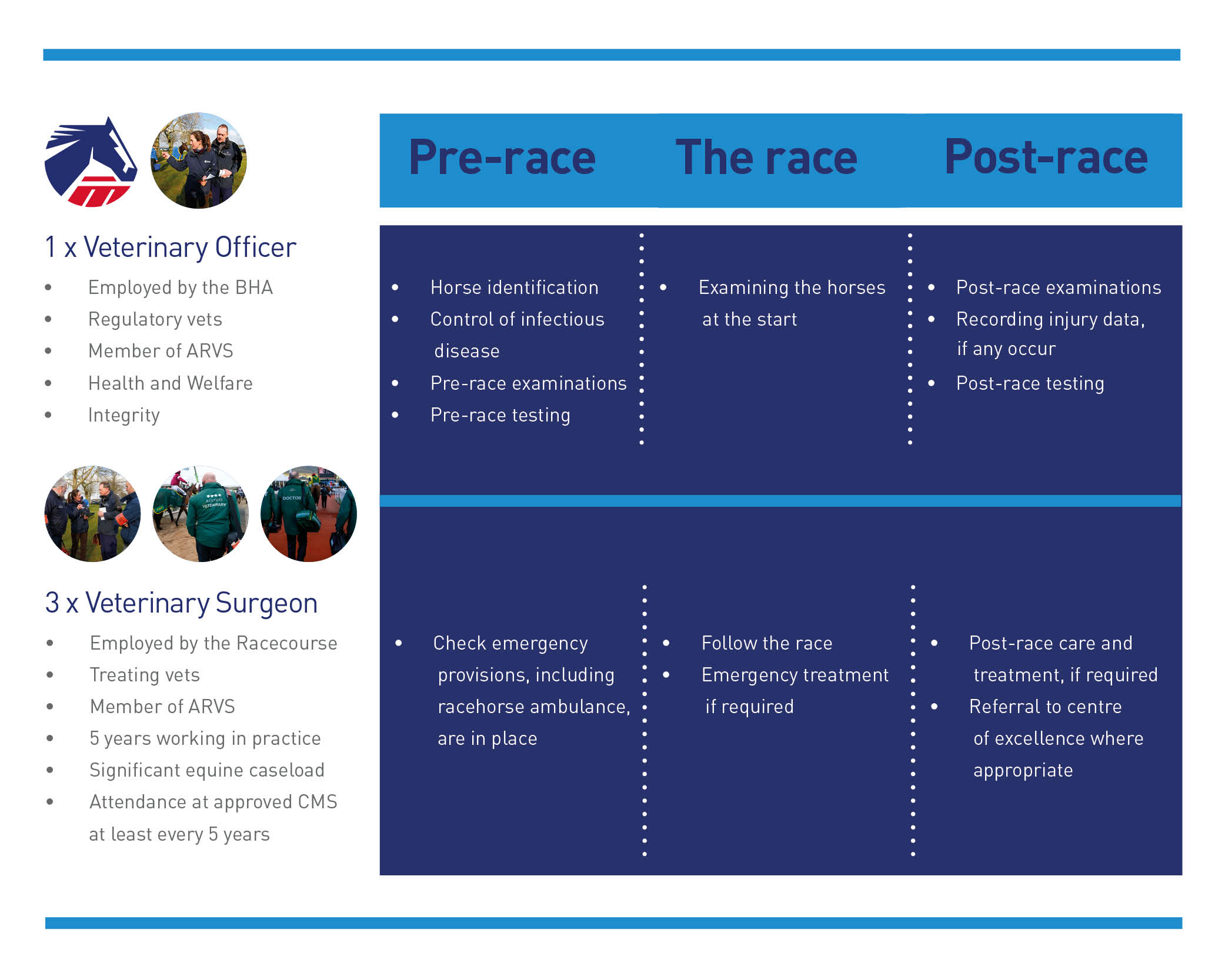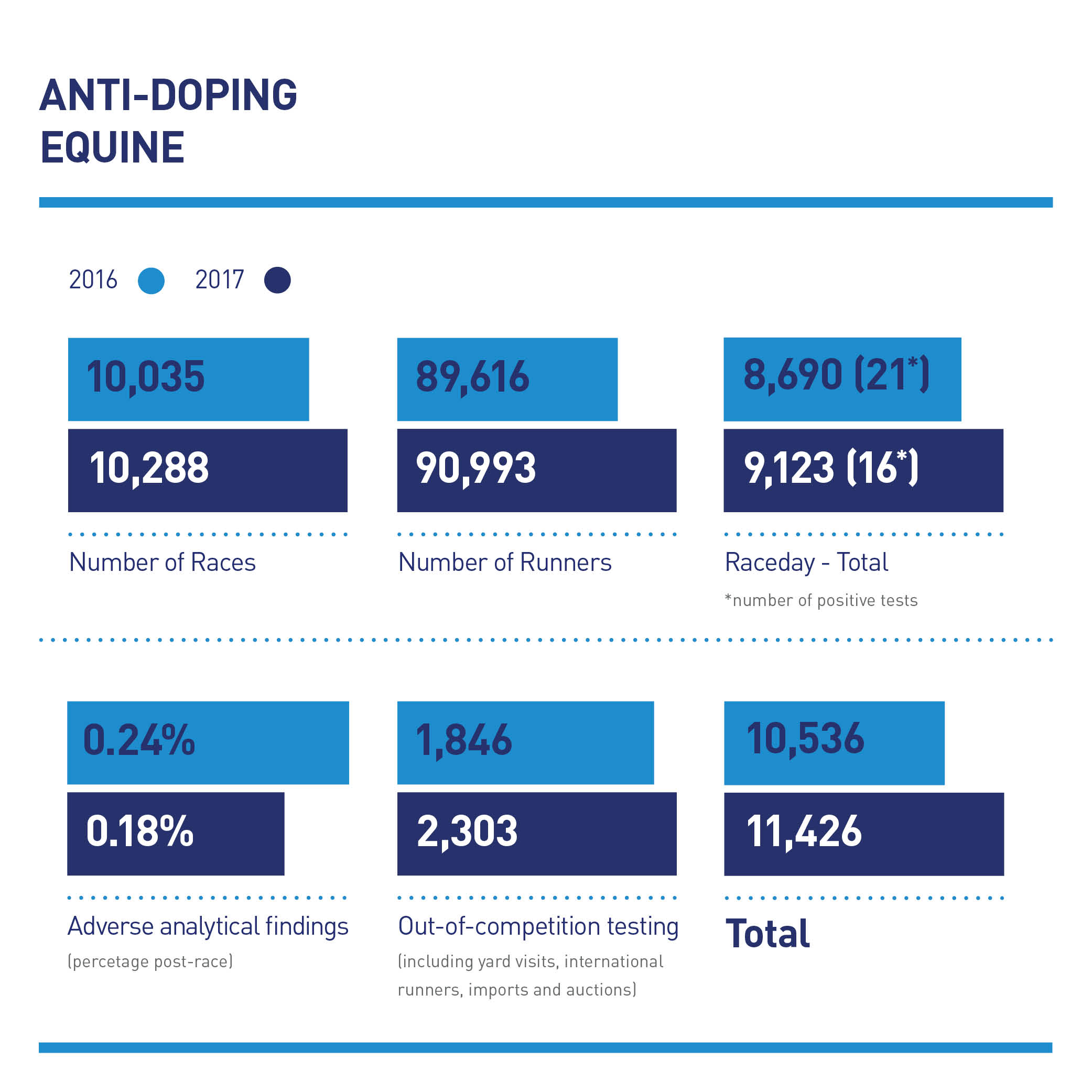At all times during a racehorse’s life, including when in training, at the racecourse or after its racing career has finished, the BHA requires that the health and well-being of the horse should be the primary consideration of those responsible for the horse’s care.
The BHA is the sport’s independent regulator. It sets and enforces the standards to which everyone involved in the sport must adhere.
Those standards apply from the very early stages of a horse’s life, throughout their training and racing lives and beyond the end of their racing career.

Birth
The BHA requires that all thoroughbred foals intended for the racing industry are registered within 30 days of their birth. This helps us to trace and track horses that are bred for the sport from their very earliest days.
Knowing which horses have been bred for our sport, and where they are, means that we can access these horses at any time to ensure that they are receiving the high welfare standards that we expect of horses bred for the sport, and for testing purposes.
Education
The importance of equine welfare is made clear to anyone involved in the sport In particular, anyone attending the sport’s main learning centres, the British Racing School and Northern Racing College, is required to sit modules and tests that emphasise and build understanding of good horse care
Trainers and jockeys
For a horse to take part in British racing it must be registered as being under the care or control of a licensed trainer.
No trainers are licensed by the BHA unless they are proven to be suitable persons to look after racehorses, operating training premises which meet strict welfare guidelines.
Thoroughbred horses’ training and lifestyles should involve the best possible care. We expect them to receive high-quality feed, facilities and bedding to ensure they are happy, comfortable and healthy.
In the same manner, no jockey is handed a licence to ride unless they have proven that they meet the high standards required of all licensed jockeys, be they professional or amateur.
Licences are renewed by application every year so trainers and jockeys must maintain these standards throughout their career, or risk losing their licence.
The BHA’s inspecting officers regularly inspect training yards, and check the condition of the horses that live there, to ensure that strict welfare criteria continue to be met and that the horses are fit and well cared for by the trainer and their vets.

There were 626 inspections in 2019, which included New Applicant Inspections, Update Inspections, Re-Inspections, Target Inspections, Change of Stables Inspections and Central Facilities Inspections.
Racecourses
As with trainers, no racecourse is licensed unless its premises, facilities, and the way it is operated meet strict equine welfare criteria, which far exceed those demanded by animal welfare legislation.
In addition, no racing can take place at any British course unless all equine welfare standards, measures and criteria are deemed to have been met by the British Horseracing Authority.
These standards are enforced by the BHA’s team of racecourse inspectors who visit courses frequently on and before racedays to ensure that courses are safe and fit for racing.
The requirements include high standards of facilities and course management, including the provision of experienced veterinary surgeons and state‐of‐the‐art veterinary facilities on course – such as horse ambulances – to ensure the very best treatment of any injury.
The BHA also works with racecourses to ensure the continual improvement of welfare standards. Improvements range from minor alterations to racecourse facilities, through to significant reviews and changes to racecourse layout. Partly as a result of these improvements, the sport’s fatality rate has declined by one-third in the last 20 years, to below 0.18% of runners.
Find out more about innovation and improvement to racecourse safety here
The Rules and disciplinary procedures
The core objectives of the Rules of Racing are to ensure a level playing field and to protect the welfare of the sport’s participants.
The rules include strict requirements on how horses should be ridden during a race to ensure their welfare, such as:
– Riding in a manner that is not dangerous, careless or improper or causes interference to other horses
– Pulling up horses who are tired or if there is any concern about their welfare.
– Adhering to the sport’s strict rules on use of the padded, air-cushioned whip
– Not remounting horses if the rider has been unseated
Also written into the rules of the sport are the responsibilities of all licensed persons to ensure that they act in the best interests of horses at all times.
Any individual who falls short of the standards expected of them, be it a raceday infringement or something which occurs at any time to a horse who is in their care or control, will face sanctions by the BHA, adjudicated by the sport’s independent Disciplinary Panel and reported publicly.
Raceday
On a raceday, the BHA’s teams of independent officials all play a role in ensuring the welfare of equine participants. For example:

– The Stewards ensure that the Rules of Racing are upheld throughout the raceday , ensuring that horses are ridden and handled fairly, considerately and safely
– Equine Welfare Integrity Officers (EWIOs) are responsible for horses housed in the racecourse’s secure stabling areas, ensuring that only accredited individuals have access to the horses and overseeing the welfare of horses during their time in the stables
– As well as carrying out their core regulatory duties, our Starters and Judges are also responsible for visually assessing horses and the equipment they are wearing, in particular before the start of a race. Any concern about a horse’s welfare will be flagged with the Veterinary Officers.
– The team of BHA Veterinary Officers is on the racecourse to oversee equine welfare Their role includes:
– Ensuring that the sport’s strict welfare rules and standards are adhered to,
– Overseeing teams of veterinary surgeons employed by the racecourse
– Carrying out pre-race checks on horses to ensure they are healthy and fit to race, and perform post-race checks on horses after they have run carrying out any testing, as appropriate.
One Veterinary Officer and three Veterinary Surgeons are required on a racecourse as a minimum requirement for the 1,500 race meetings that take place in Britain each year.
For festivals, there will be five Veterinary Officers and eight Veterinary Surgeons present per meeting. Each Veterinary surgeon is a member of the Association of Racecourse Veterinary Surgeons (ARVS).

Find out more about the ARVS critea for Veterinary Surgeons here.
Medication and anti-doping
The rules regarding the use of medication are in place to ensure a level playing field and protect the welfare of our animals.
Racehorses are elite athletes. Like human athletes, our equine athletes may require treatment from time to time. Use of appropriate medication or supplementation to treat injury or illness and meet nutritional requirements is important for the overall health and welfare of racehorses and is permitted, within strict rules and guidelines.
The rules state that, “a trainer must ensure that all treatments and medication administered to a horse under his care or control are given in the interests of its best health and welfare” and that “every treatment must be fully justifiable by the medical condition of the horse receiving the treatment”.
However, the use of substances to produce a performance-enhancing effect, or in a manner that may jeopardise a horse’s welfare, is strictly prohibited. Horses cannot be given any substance other than food or water on raceday, and must not have any trace of pre-administered substances which might affect their body systems present on raceday. The BHA has adopted a “zero tolerance” approach to anabolic steroids, which are prohibited at all times.
The BHA operates a rigorous anti-doping regime and tests extensively for prohibited substances, both in and out-of-competition and pre and post-race, and also has access to medication records for all horses in training.

Science and research
Since the year 2000, around £35m has been invested by the HBLB and third parties, with veterinary funding distributed to a wide variety of research areas.
This research benefits not only thoroughbred racehorses, but all breeds of horses in the UK.
Find out more about how science and research is used to make horsesracing safer
Centre for racehorse studies
The BHA Centre for Racehorse Studies (CRS) is located within the British Racing School (BRS) in Newmarket. This is a programme, run by the BHA, that conducts studies to provide research around medication use in horses and which are used for determining international guidelines for medication control.
The CRS simulates training conditions at the BRS and relies on horse donations. The horses at the CRS receive first class care and the outcome of the studies help increase worldwide awareness on medication use in horses. The CRS horses participate in a limited number of studies, all under precise Home Office and veterinary control.
Horses generally stay at the CRS for two or three years and are then rehomed to suitable homes to continue in a third career.
The CRS is a signatory of the Concordat on Openness on Animal Research. In being a signatory the CRS agrees to work to fulfil the commitments of the Concordat, initiate projects and strategies that are relevant and appropriate to the CRS, be open about the use of animals in research and provide annual updates to the body about CRS research.
Ethics Committee
The BHA operates an Ethics Committee to advise the BHA Board on the ethical implications of BHA activities, both in specific issues that may arise in racing and in scientific research that is being conducted and/or funded by the BHA (equine or human).
The Committee includes five independent members; a nominee from the British Racing School, an independent legal expert in the field of ethics, an animal welfare nominee, an independent expert in the field of pure ethics, and a BHA Board nominee with medical expertise.
A key element of the Committee’s role is to provide independent oversight of the local ethical review process undertaken by the Animal Welfare Ethical Review Board (AWERB) for the Centre for Racehorse Studies (CRS) under the Animals (Scientific Procedures) Act 1986; and to approve all individual study protocols to be carried out under the Project Licence held on behalf of the BHA.
Life after racing
The end of a thoroughbred’s racing career does not mark the end of the duty of care that the sport shows to those animals.
Each year, British racing invests significantly in programmes that rehome and retrain former racehorses, including through the sport’s dedicated charity for the rehoming and retraining of racehorses – Retraining of Racehorses (ROR).
